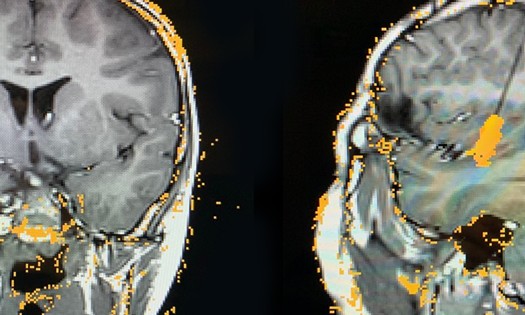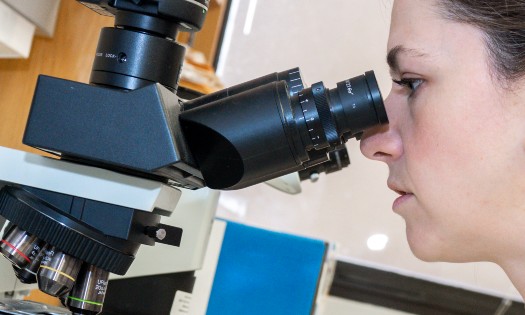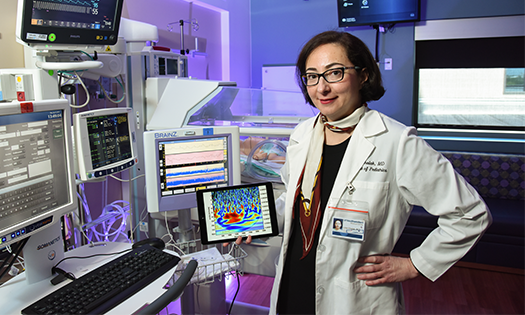The Innovation: Pursuing cures for children when solid tumors come back or don’t respond to initial treatment
Chemotherapy can often cure pediatric solid tumors. However, few treatments can eradicate the cancer or even achieve long-term disease control if it comes back or doesn’t respond to chemotherapy. Better therapies are urgently needed for these cases.
Pediatric hematologists and oncologists at Children’s Health℠ and UT Southwestern are pursuing a potential, promising solution. Recent research involves an innovative clinical trial that combines chemotherapy and immune checkpoint inhibitors (ICIs) for children with relapsed or refractory solid tumors. ICIs have revolutionized treatment for some adult cancers. But ICIs, such as programmed death receptor 1 (PD-1) and programmed death receptor ligand 1 (PD-L1) inhibitors, do not have strong activity against pediatric solid tumors.
Matthew Campbell, M.D., Pediatric Hematologist/Oncologist at Children’s Health and Assistant Professor of Pediatric Hematology/Oncology at UT Southwestern, believes chemotherapy could potentially boost the activity of ICIs in children. He is leading VITAS, one of the first clinical trials in the U.S. to investigate the effect of combining an ICI with chemotherapy in pediatric patients with solid tumors. The trial is a component of the Developmental Therapeutics Program at Children's Health, where pediatric cancer patients are treated under the umbrella of the UT Southwestern Harold C. Simmons Comprehensive Cancer Center, the only National Cancer Institute-designated comprehensive center in north Texas.
The big picture: Can chemotherapy make ICIs more effective in pediatric cancer?
Many ICIs interfere with PD-L1, a molecule that cancer cells make that helps them hide from the immune system. By blocking PD-L1, ICIs can help immune cells recognize and kill tumors.
“There are probably many reasons why pediatric tumors don’t respond well to ICIs. But the underlying idea is that these tumors are less immunogenic than adult tumors,” Dr. Campbell said.
They have far fewer mutationsthan adult tumors, and don’t produce as many abnormal molecules that can get the attention of the immune system. So even if ICIs bring tumor cells out of hiding, immune cells still can’t recognize them.
However, studies suggest that chemotherapy can make pediatric tumors, such as Wilms tumor and rhabdomyosarcoma, more immunogenic. Over the last several years, chemotherapy has also been shown to boost ICI response in adult patients, and the combination of chemotherapy and ICI is now widely used for a range of adult solid tumors.
“The idea behind the VITAS trial is to determine whether chemotherapy can make pediatric tumors more exposed to the immune system and help the immune system fully attack and eliminate pediatric cancer cells,” Dr. Campbell said.
In planning the trial, it was important to select chemotherapies that would not wipe out the immune system. That’s because ICIs need the immune system to attack the cancer cells. The research team chose vincristine, irinotecan and temozolomide, a trio of agents that is used to treat rhabdomyosarcoma and other pediatric tumors. For the PD-L1 inhibitor, they are using atezolizumab.
The research team hopes that ICIs could also enhance the response to chemotherapy. Studies looking at tissue biopsied from adult tumors and lab models of cancer suggest that immunotherapy’s immune-stimulating effects may help counter chemotherapy resistance.
“It would be a two-strike approach where the chemotherapy would help the effectiveness of the ICI, and the ICI would help prevent the tumor from developing resistance to chemotherapy.”
Key details: The VITAS clinical trial is recruiting patients
VITAS is a phase I trial that primarily studies the safety of combining chemotherapy and ICI. It is currently recruiting six children between the ages of 6 months and 18 years with any type of solid tumor that relapsed or didn’t respond to initial treatment of chemotherapy and often also radiation and surgery.
In addition to Children’s Medical Center Dallas, VITAS hopes to open future sites at Texas Children's Hospital, Ann & Robert H. Lurie Children's Hospital of Chicago, Dana-Farber/Boston’s Children Hospital, Children's Hospital of Philadelphia, Cincinnati Children's Hospital and Seattle Children’s Hospital.
VITAS will continue to a phase II study if no more than two of the six children in the phase I cohort develop serious side effects that make them stop treatment. The phase I study will also look at other safety and efficacy outcomes, such as the number of children who respond to treatment and how long the response lasts. Dr. Campbell thinks they will have the phase I study results by mid-2024.
The phase II study would look at the same safety and efficacy outcomes in 17 children with relapsed or refractory rhabdomyosarcoma, one of the most common solid tumors in children. Children with this disease who responded well to treatment in the phase I study may be eligible to be included in the phase II cohort.
“Some of this regimen’s appeal is that the chemotherapy and immune checkpoint inhibitor are generally pretty well tolerated, at least separately,” Dr. Campbell said. “Another good thing is that the treatments can all be given in the clinic and there are no planned hospital admissions.”
Patients in the phase I trial will receive treatment every three weeks for up to two years, as long as they are responding and not experiencing serious toxicity.
As part of VITAS, the research team will collect blood, fecal and tumor samples from patients to try and identify molecules associated with treatment response.
“In addition to seeing if the combination therapy works, we also want to understand why it works,” Dr. Campbell said.
The findings could one day help doctors predict which patients will respond to combination chemotherapy and ICI, and boost the activity of this treatment for all children.
Why Children’s Health? Expanding early-stage research of immunotherapeutic approaches
Children’s Health and UT Southwestern have a long history of leading pediatric cancer studies and providing excellent care. We’re now working to conduct more early-stage trials of immunotherapy-based approaches, with the goal of transforming care for children with some of the most challenging cancers. The VITAS trial is a component of the Cellular and ImmunoTherapeutics Program (CITP), which is a clinical and research program endorsed and partially funded by the joint pediatric enterprise between Children’s Health and UT Southwestern.
We also strive to educate more pediatric oncologists about our research so they can learn about the latest approaches and help find trials for their patients. Our team will soon roll out a newsletter about our clinical research. We’re also developing an online survey in REDcap that referring providers can complete and receive a response within 24 hours, telling them whether their patient may be eligible for one of our trials.
“We want to make sure that every single patient in our region that could potentially be eligible for a trial is being considered for a trial,” Dr. Campbell said.



